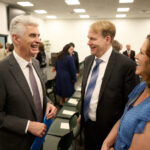(RNS) — New York City Mayor-elect Zohran Mamdani spoke unapologetically about his Muslim faith and democratic socialist roots during his victory speech on Election Day (Nov. 4). In a sharp rebuke to the Islamophobic attacks he faced during the campaign, Mamdani said his mayoralty would be one where Muslim interests would be taken seriously in New York, “where the more than 1 million Muslims know that they belong — not just in the five boroughs of this city, but in the halls of power.”
Political experts say Mamdani’s historic win may motivate more Muslims and younger progressives to seek – and attain – those halls of power.
“Mamdani definitely has invigorated many Muslims around civic participation,” said political consultant Salima Suswell. “And I do think that there will be young Muslims who look up to him and want to follow in his footsteps, which I think is an amazing thing.”
The Council on American Islamic Relations, a civil rights and community engagement group, estimates that at least 37 other Muslim Americans won in elections on Nov. 4, among them Virginia Lieutenant Governor-elect Ghazala Hashmi; Dearborn, Michigan, Mayor Abdullah Hammoud; Dearborn Heights Mayor Mo Baydoun; and Virginia House Delegate Sam Rasoul.
Nabilah Islam Parkes, who became the first Muslim woman to serve in the Georgia Senate in 2023, anticipates that more Muslims will be inspired by the success of Mamdani and other Muslims, as she was by the electoral victories of Democratic U.S. Reps. Ilhan Omar of Minnesota and Rashida Tlaib of Michigan. She said these Muslim women showed her that faith does not have to be a barrier to political office.
“They were definitely a catalyst for me as a young Muslim woman,” Parkes said. “It’s our time. We don’t have to wait for some far away time to run for office in this country — when there’s less Islamophobia.”
Mamdani not only showed that winning office was possible, he invited Muslims to rethink their relationship with politics in places where Muslims have felt dismissed or even betrayed by the political system. “I think this creates hope for people that there can be diverse representation in the political world, and not just diverse in imagery, but also diverse in thoughts,” said Saman Waquad, president of the Muslim Democratic Club of New York City, where Mamdani spent time early in political formation.
Waquad said Mamdani’s progressive politics are not for the Muslim community only, attracted a wide range of voters. “We can have political leadership that actually cares for the people and wants to make the city and this country livable and affordable,” she said, “and a political leader who actually thinks about the most disenfranchised folks.”
RELATED: Inside Zohran Mamdani’s bid to win over religious New Yorkers
While a majority of Muslim American politicians are Democrats, they are not uniformly progressive, and most tend to be more conservative on economic stances than Mamdani, said Nura Sediq, a political science professor at Michigan State University. Still, Mamdani’s election, Sediq said, has energized some Muslim disillusioned by the Democratic establishment, who are seeing renewed possibilities in Mamdani’s rapid rise from state assemblyman to mayor.

Zohran Mamdani, joined by his wife and parents, speaks during a victory speech at a mayoral election night watch party, Tuesday, Nov. 4, 2025, in New York. (RNS photo/Fiona André)
“Younger progressive candidates are going to feel more emboldened to take the shot and go from being a state legislator to mayor or a Senate seat quicker,” Sediq said.
For Abdul El-Sayed, a progressive Democrat running for U.S. Senate in Michigan, the rising number of Muslims in office is a reflection of a community with growing frustration with American politics. “So long as we continue to have a democracy, they can seek to express themselves in that highest order of citizenship, which is to run for an elected role in their government,” he said. “And that’s a beautiful thing.”
RELATED: Muslim voters didn’t cost Dems the 2024 election, a new poll says. But they may have found their voice
Some are concerned that, with increased visibility, the new wave of Muslim candidates will attract anti-Muslim bias. Islamophobia is on the rise, according to recent data from the Institute for Social Policy and Understanding, which surveyed close to 2,500 people to measure anti-Muslim sentiment among the public.
But CAIR, in a Nov. 6 statement, said that success at the ballot is an important way to push back against Islamophobia. “At a time when many American Muslim candidates endured slander, harassment, and overt Islamophobia, their strength and dedication to public service send a clear message that bigotry has no place in American politics and that Americans are rejecting anti-Muslim campaign rhetoric and cheap political attacks.”
Parkes, the Georgia state senator, agrees that running for and winning office is a antidote to Islamophobia, giving politicians a powerful platform from which to correct misunderstandings about the faith. “It’s so important that we see positive images of Muslims leading and leading well. It combats horrific narratives that are being spewed,” she said. “We are defining ourselves rather than being defined by the far right.”
As important as the increase in Muslim candidates, said Suswell, is the number of Muslims registered to vote, which is higher today than in 2016, ISPU data shows. With Muslim-led organizations mobilizing voters, supporting candidates and forming PACs, all signs point to a growing and diverse Muslim voter bloc.
“We are doing the work,” said Suswell. “As a community, building political power is paramount to us establishing change and supporting the unique needs of American Muslims.”



